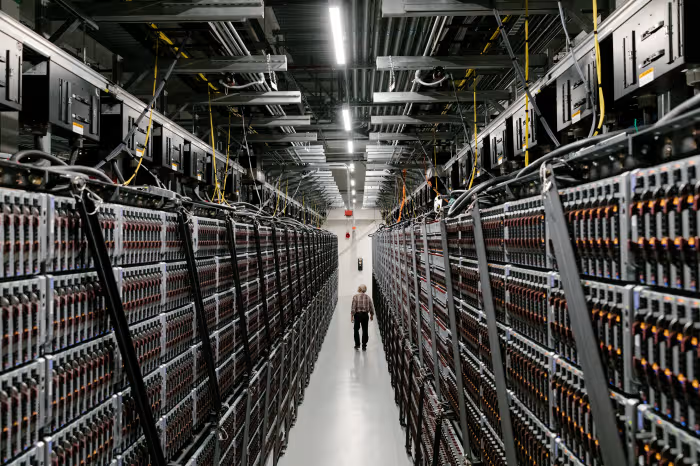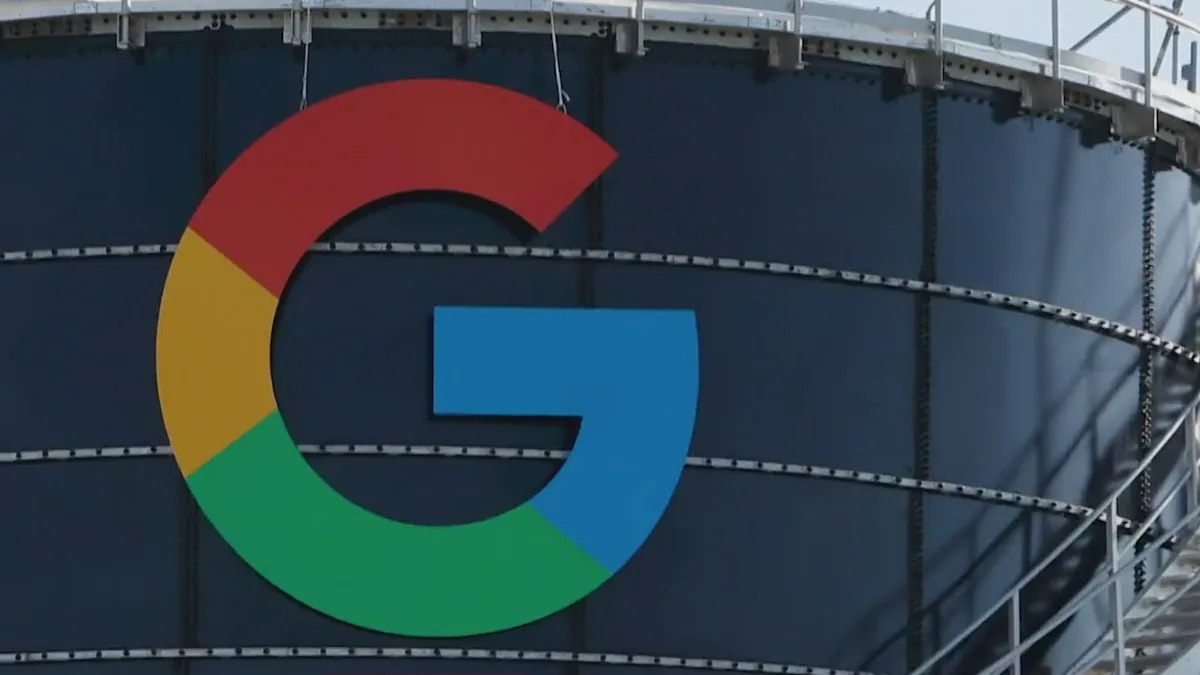Big Tech Accountability Winning on Culture, Data Centers Black-boxed by NDAs
This week in The Dispatch we’re covering early signs that Big Tech AI companies are losing the culture wars, states get gag-ordered into subsidizing data centers.

Welcome back to The Dispatch from The Tech Oversight Project, your weekly updates on all things tech accountability. Follow us on Twitter at @Tech_Oversight and @techoversight.bsky.social on Bluesky.

🎬 PODCASTS, MEMES, SHORT-FORM VIDEO: How Tech Accountability is Winning the Culture Wars: The dams are breaking, and even apolitical pop culture spaces — entertainers and platforms expected to agreeable and commercially useful — have started talking about Big Tech in the language of actual harm: extraction, impersonation, land grabs, the infrastructure that drains local power and public money. Not as policy, not as panic — just as the cost of how the industry works.
Last week Charlie Berens and Daniel Van Kirk posted a sketch about “inventing data centers”:
“We wanna become trillionaires… that means we need to steal the people’s data so AI can take their jobs.”
“We don’t call them the people — we call them the product.”
“Is it a land grab? Yeah… but mass surveillance isn’t free.”
Berens has been sounding the alarm for months about Microsoft’s planned data-center buildout in Wisconsin — the land-use fights, the massive power draw, and the public costs the company pushes onto local communities – and you wouldn’t be wrong for calling this “corporate socialism.”
Joseph Gordon-Levitt has been posting videos and Instagram reels pointing out how Meta’s chatbots harm kids — a feature, not a bug, that allows the company to make money at their expense. He highlights internal documents showing bots approved to engage minors in ways no system should, and he’s blunt about the throughline: profit first, safety nowhere.

On a recent podcast, Aziz Ansari said AI tools are “outsourcing critical thinking,” hollowing out the part of daily life people rely on to make sense of the world. It’s not framed as technophobia — it’s framed as a cultural loss.
And Scarlett Johansson’s response to the viral deep-fake of her likeness treated AI impersonation as a structural risk: a technology that can override identity and slip past accountability until the damage is already done.
What ties these moments together is that the issues have finally broken through. When celebrities start talking about data extraction, impersonation, disappearing creative work, land grabs, and strained infrastructure, it stops being a niche policy fight — and it becomes impossible for Congress to ignore.

🔋 SHUT UP AND SUBSIDIZE: Big Tech’s data centers are reshaping America’s power grid, water supply, and local budgets — and doing it all behind nondisclosure agreements. In cities from Arizona to Indiana, elected officials are being asked to vote on billion-dollar projects they aren’t allowed to describe, negotiate, or even identify. The companies demand silence as a condition of investment.
According to a new report from the American Economic Liberties Project, at least 25 of 31 Virginia localities negotiating data-center deals are bound by NDAs – some will last decades, outliving the officials who signed them outside of the public eye. In Tucson, Amazon’s project was known only as Project Blue until a journalist uncovered its identity weeks after approval. Local supervisors said they voted blind — unaware of who the end user was, how much power or water it would consume, or what it would cost residents.

The secrecy is deliberate. The same corporations that drain public resources also drain the public of oversight opportunities. Google and Meta claim their electricity and water usage are “trade secrets.” State regulators, barred from disclosing it, can’t even warn ratepayers that their bills are rising to cover Big Tech’s discounts. In one Minnesota deal, Google paid 10% less for power; in Arizona, it sought to pay half the residential water rate.
Taxpayers are footing the bill twice — once through subsidies, again through inflated utility rates — while the corporations hide the details behind contracts that local governments are legally gagged from discussing. The result is economic capture, conducted under the legal cover of confidentiality.
Why the NDAs? Because if communities could see the real numbers — the $8 billion Amazon took from Indiana, the 50-year tax abatements in Virginia, the billion-dollar power discounts spreading across the West — they’d never sign off.
NDAs are not neutral paperwork. They are the mechanism that turns public infrastructure into private property. And until states ban NDAs for Big Tech corporations outright, CEOs like Bezos, Zuckerberg, and Musk will keep building in secret — with your water, your power, and your taxes.

💸 ACCOUNTING FOR NOTHING: Microsoft and OpenAI built the most valuable black box in the modern economy — one Wall Street can’t see into but keeps rewarding anyway. Microsoft owns about 27% of OpenAI, books billions in “losses,” and is owed hundreds of billions in cloud revenue in return. They buy from, sell to, and invest in each other — sometimes in the same transaction — while refusing to explain how any of it works.
Under accounting rules, Microsoft should disclose how that relationship affects its books. It doesn’t. The numbers don’t add up; they loop. OpenAI owes Microsoft $250 billion for cloud services but loses billions a quarter. Microsoft calls its $135 billion stake possibly worthless.
Amazon and Anthropic run the same scheme: Amazon invests $8B, Anthropic commits billions right back to AWS for compute, and the “investment” gets counted as revenue for Amazon's cloud business.
Google and Anthropic run the same play too: Google invests billions and, in return, Anthropic has to buy huge amounts of computing power from Google — in a deal worth “tens of billions” according to CNBC.
Then there’s Nvidia — the latest edition to the Mount Rushmore of Big Tech monopolies. The company uses its chip monopoly to manipulate other levels of the AI stack — taking ownership stakes in burgeoning companies and would-be competitors in exchange for chip access and deals locking them in to Nvidia’s cloud services. Little tech companies feel the squeeze and Nvidia has locked in customers.
Their smaller deals aren’t the only ones deserving of scrutiny. They’re colluding with other Big Tech giants in data center deals, and there’s little to no oversight — just look at its deal with OpenAI.
A nonprofit owns a for-profit that owns subsidiaries run by investors whose capital is also their product. Microsoft funds OpenAI; OpenAI pays Microsoft back. Amazon funds Anthropic; Anthropic pays Amazon back. Google funds Anthropic; Anthropic pays Google back. Nvidia funds the entire sector — and the sector pays Nvidia back.
The question isn’t whether these deals break rules. It’s whether the rules still apply. These open questions are oversight opportunities, and Congress and the SEC could demand answers now. Sunlight will always be the best disinfectant to protect the public’s interest.

🔍 THE SEARCH FOR ACCOUNTABILITY RETURNS ZERO RESULTS: Judge Mehta didn’t just let Google off the hook — he handed it the keys to its next monopoly. After finding Google guilty of illegally monopolizing search, Mehta declined to order a breakup, a choice screen, or any structural fix. The “remedies” were decorative: one-time data sharing, short-term licensing, and a ban on certain exclusive deals that Google can easily reroute. In effect, the judge preserved the very monopoly he ruled unlawful — and turned it into a down payment on the next one.
Weeks after the decision, Axios asked unnamed AI executives which U.S. company they fear most. The unanimous answer: Google. With no real limits on its dominance, Google is positioned to do what monopolies do best — use one market to capture another. It can bankroll Gemini development with search profits, preload it across Chrome and Android, and even offer it free, to starve should-be competitors of revenue.
That’s the consequence of letting a trillion-dollar company keep its monopoly and war chest intact: it can subsidize itself into every new industry. The same tactics that crushed competition in search now power AI, cloud, and hardware. Meanwhile, publishers are already watching traffic collapse under Google’s “AI Overviews,” which rewrite their reporting and divert web traffic.
Judge Mehta didn’t close the case; he opened the floodgates. Google’s punishment for monopolizing search is the freedom to monopolize everything else.

The United States is on the Cusp of a Digital Dark Age
Dean Jackson, Samuel Wooley, Tech Policy Press












